Your Complete Guide to the Spin-Offs of Attack on Titan
by Theron Martin & Rebecca Silverman,In a franchise as titanic as Attack on Titan, where is the line drawn between canon and fanfiction? With spin-off media from anime to manga to light novels to choose from, some adherence to the creator's style and vision is expected for an Attack on Titan work to feel like it belongs in the same universe as the manga that started it all.
With its strange yet alarmingly familiar world, hundreds of years of potential history to explore, and universal themes explored through a massive cast of characters, Attack on Titan has been able to expand into Western comics, anime, novels, and even parody. While Isayama's original work is detailed enough to enjoy on its own, ANN's own Theron Martin and Rebecca Silverman are prepared to dig deep into the Titan universe's numerous spin-offs to give you a run-down of what side materials are worth checking out in this sprawling franchise. (In cases where multiple versions of a spin-off exist in more than one medium, we'll just review one version.)
SPOILER WARNING: This article assumes familiarity with the entire first season of the anime series or its manga equivalent.
OVAs

Ilse's Notebook
Theron: Numbered episode 3.5, this was originally released in December 2013, bundled with volume 12 of the manga in Japan, making it the first spin-off OVA. (In the U.S., it's included in the Special Edition version of volume 17.) It focuses on Hange and her obsessive efforts to capture a Titan alive for study. She gains a new perspective on this quest when the body of a soldier presumed lost in an expedition a year ago is found, whose notebook chronicles her experiences with a very unusual Titan. This sometimes-harrowing episode is easily the most potent of the OVAs in content, examining the brief life of a young woman who tries to combat her fear by writing down all of her thoughts, in the process teasing some revelations that finally come out in the second season of the anime series.
Is It Worth Watching? Yes. It's one of the two strongest OVAs, and it also adds some nice details to the story.

A Sudden Visitor
Theron: Numbered episode 3.25, this episode was originally released in April 2014, bundled with volume 13 of the manga in Japan. (In the U.S., it's included in the Special Edition release for volume 20.) The focus is on Jean during his academy days, where an argument with Sasha leads to a cooking duel between them, which Commander Pixis exploits to get a good meal. Though the episode has some serious content involving Jean's relationship with his mother (the titular visitor), it mostly spends its time poking fun at the melodramatic style of the series. It's also the source of those shots where Mikasa showcases her famous abs that you may have seen circulating online.
Is It Worth Watching? While it does expand on Jean's background, it otherwise makes little notable contribution to the franchise, so don't sweat hunting it down at least.

Distress
Theron: Numbered episode 3.75, this episode was originally released in August 2014 bundled with volume 14 of the source manga, but it's not yet available in the States. It involves a training mission during the 104th's cadet days, where the main cast had a run-in with thieves who stole their equipment. It returns the OVAs to a purely serious tone and expands on the setting a little by showing the cadets respond to a purely human-based crisis.
Is It Worth Watching? Yes. It's even better than an average episode of the main series.

No Regrets
Theron: Based on a spin-off manga of the same name, the two episodes of this OVA series were released in Japan in December 2014 and April 2015 respectively, and they're bundled in the Special Edition releases of volumes 18 and 19 in the States. This prequel chronicles how Levi moved from being a Robin Hood-style criminal in an underground city to a Survey Corps member and loyal follower of Erwin Smith. The title of the OVAs refers to Erwin's insistence that Levi has to keep moving forward after a Titan-based calamity strikes. The main draw of these OVAs is providing a new setting within Attack on Titan's world, while filling in the backstory for one of the franchise's most popular characters.
Are They Worth Watching? While the underground city is an interesting addition to the setting, the story here is pedestrian by franchise standards, so it's only worth checking out if you're a big fan of Levi.
Manga
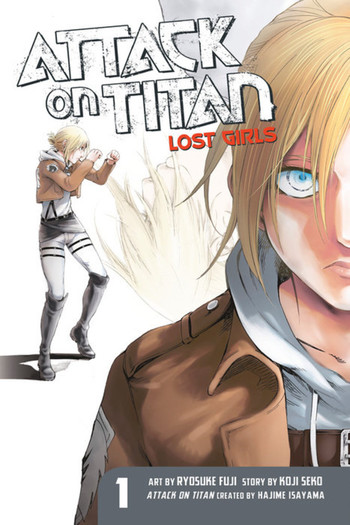
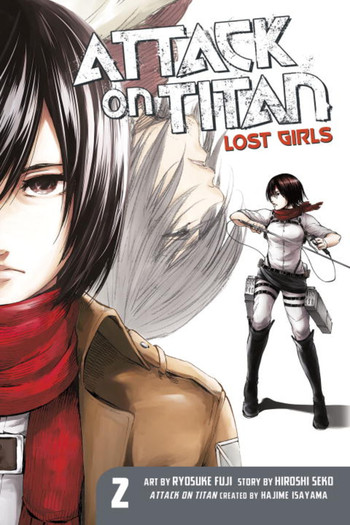
Lost Girls by Hiroshi Seko, art by Ryōsuke Fuji. Kodansha Comics, $10.99 each.
Theron: This two-volume manga was released in 2016, adapting a light novel of the same name. The first volume features Annie Leonhart on the day before she heads out to secure Eren during the Survey Corps expedition – in other words, right before she first appears as the female Titan. To take her mind off the bloodshed she might have to inflict, she spends the day working on a missing person case involving a nobleman's daughter, a mission that winds up being dangerous in more than one way. The second volume features Mikasa, mostly involving a dream sequence after her fall in episode 7 of the anime, giving us an alternate version of her tragic past with Eren. The final chapter brings both women together in an encounter spanning both the past and future of their lives as comrades.
The first volume is the best part because of its fresher and more complicated story, its emphasis on Annie's moral struggle with her mission, and its opportunity to show off Annie's martial arts acumen in human form. Both volumes retain the style and feel of Isayama's original story relatively well.
Are They Worth Reading? Maybe. None of the stories presented in these volumes are especially compelling, but they're not bad either. If you're a fan of either lost girl in question, this is basically more quality time with them.

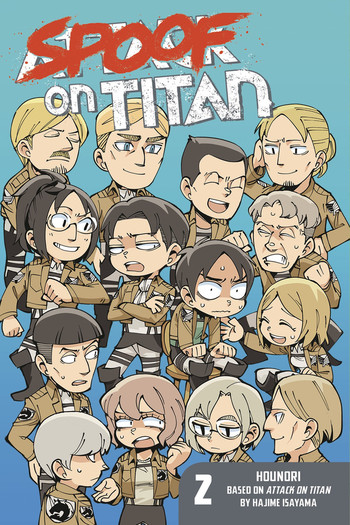
Spoof on Titan by hounori, Kodansha Comics, $8.99 each.
Theron: These two volumes, released in Japan in 2013-2014 and in the U.S. in 2016, are exactly what the name suggests: parodies of the source manga done in 4-koma format. They're relatively short compared to normal manga volumes.
Are They Worth Reading? While they contribute nothing new to the world of Titan, they're more consistently funny than Attack on Titan: Junior High.
Light Novels
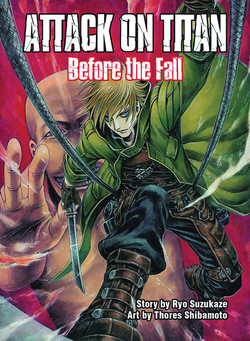
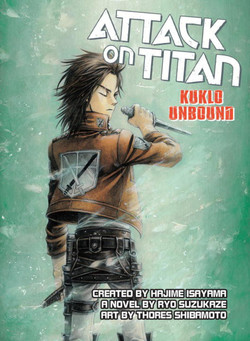
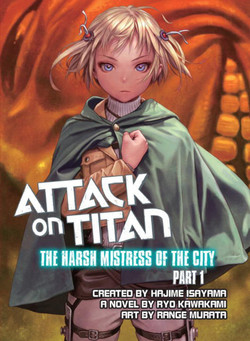
Before the Fall by Ryo Suzukaze, illustrations by THORES Shibamoto. Vertical, $10.95
Kuklo Unbound by Ryo Suzukaze, illustrations by THORES Shibamoto. Vertical, $10.95
Harsh Mistress of the City (2 volumes) by Ryō Kawakami, illustrations by Range Murata. Vertical, $10.95 each; audio version available.
Rebecca: Four prequel novels to the main series, divided into three time periods and plots, explore what happened long before Eren and his companions strapped on their Vertical Maneuvering Equipment. The first two are placed under the heading “Before the Fall” and discuss what life was like before Wall Maria went down. The other two comprise the Harsh Mistress of the City story, basically a novel in two volumes, and discuss what happened directly after the Fall. These two are beautifully illustrated by Range Murata, who brings his own doll-like sensibility to the brutal story. Together these four books explore what brought things to where they stand in the main series, filling in hints dropped by Isayama in the manga.
Of the three, the most significant is probably Before the Fall. Set in Shiganshina, close to Wall Maria, it tells the story of the smith who first created the Vertical Maneuvering Equipment, Angel Aaltonen. Only eighteen, Angel is a craftsman with an eye for innovation and design, and that, along with the discovery of a new mineral known as iceburst stone, allows for him to create the essential equipment. Not only does this allow the Survey Corps to actually fight against the Titans, but it also elevates them from the scum of the military to the elite forces they are in the main series.
That's one of the most interesting details about this piece – it really works to establish the actual world the story is set in, providing us with now-outdated opinions and views as if it were historical fiction of a real place rather than a spin-off novel of a manga series. This certainly shows both Suzukaze's grasp of Isayama's world and his skill as a writer (and hats off to the English adapter as well, for capturing it), and it also gives the main series a firm base to stand on. Basically this book lays the foundation for the ongoing manga, no mean feat given that the author's not the original creator. Suzukaze shows us a world where superstition is still a driving force, where some people choose to worship the Titans as gods, and where the Survey Corps is high criticized for their expeditions – those who don't worship the monsters believe that each time the Corps leaves the city, they put it at increased risk of Titan attack. Essentially this is a much more frightened, powerless world, an almost Medieval version of when the main story takes place. I almost wish that I had entered the franchise with this novel rather than with the manga – that's how good a job it does of establishing a believable base for the main story.
The second prequel novel, Kuklo Unbound, picks up immediately after Before the Fall, in a world where Angel's invention is about to make all the difference. The premise of this novel is that a child is found, posthumously born in a Titan's vomit, by a soldier patrolling the town. Horrified by the circumstances of the infant's birth, the soldier calls him “Titan's son,” a moniker which will haunt the child for his first fifteen years. Sold as a freak, the boy is tortured until a girl, tired herself of being seen as an object, albeit in a different way, befriends him and gives him the name Kuklo. Eventually the two of them escape the manor house they've been trapped in and Kuklo joins the newly impressive (and resurrected) Survey Corps. What's fascinating about this novel is that the Corps is both Kuklo's greatest enemy and his salvation – he wouldn't be alive if he hadn't been found by the soldier, but it was that same man who saved his life who damned him to a miserable existence for fifteen years…and it was that torment that ended up giving him the skills to become a successful member of the Survey Corps himself. Suzukaze does an excellent job of working these contradictions into Kuklo's character and the story itself, setting the stage (so to speak) for the trials the characters of the main series will later face. Once again, Suzukaze's careful and skilled retrofitting is the making of this book as a prequel – he truly makes you believe that these specific events happened before the story told by another author. Anyone who has ever written a group paper or any other collaborative work can tell you how difficult that sort of meshing of words and worlds is, and it helps both of Suzukaze's prequel novels to stand out, both in the AoT franchise and as good books in their own right.
Ryō Kawakami's Harsh Mistress of the City duology doesn't quite achieve that same level, although in all fairness that doesn't appear to be what he's going for. In the afterward to the second volume of the novel, the guest essayist, an expert in warfare scholarship, comments that Kawakami's series is really about exploring the different, difficult options that people face in times of war and crisis. He's certainly got a point – Harsh Mistress of the City is every bit as much a wartime story as Elizabeth Bowen's short fiction. It is about the people who live during war rather than the actual fighting of it, and Kawakami's heroine, Rita, is a young girl thrown into an adult crisis before she is equipped to cope with it. When the Titan attack on Wall Maria leaves a small district cut off from the rest of the walled city, teenage recruit Rita is the highest ranking officer left – all of the others have either died or fled. Desperate to keep her town afloat, Rita becomes increasingly tyrannical, eventually even capturing a small Titan and keeping it tied up in the plaza to feed rebels to in public executions. Her childhood friend Mathias unwittingly becomes the catalyst for her ever-increasing madness for control when his gun misfires and kills one of Rita's subordinates; they are very quickly on opposing sides of the battle for the town's morale – Rita as the dictator and Mathias as the rebel leader. Both are changed by the war, and although they still love each other, they are unable to break free of the fears that bind them to their present courses of action. It's easy to read this and see the enemies as almost anyone, because it isn't so much the threat of the Titans that's driving their actions, but their fear of the monster that lurks outside. The need to do “right” makes it difficult to tell what constitutes the correct course, and if the second volume of the novel doesn't quite wrap things up satisfactorily – and you could definitely argue that Rita gets off too lightly – it does provide a basis for the sort of moral jumble that later occurs when Eren's initial transformation takes place. The worst enemies, Kawakami reminds us, aren't always the ones who look frightening, but maybe the fear we have of them itself.
Are They Worth Reading? Before The Fall and Kuklo absolutely are, but Harsh Mistress not as much. The first book fills in gaps of AoT's history and gives us a real sense of how the story's world came to be, while the second sets the stage for revelations in the manga in a compelling way. The last is an interesting exploration of a character, but it doesn't add much to the overall mythos.
Oddities

Choose Your Path Attack on Titan Adventure by Tomoyuki Fujinami, illustrated by Ryosuke Fujii and Tetsu Yoshii. Kodansha, $10.99. Digital version available.
Rebecca: Of all the spin-offs of Isayama's series, this one may be my favorite. Certainly it has a nostalgic appeal – if you were a kid in the '80s, you probably read at least one “Choose Your Own Adventure” book. The basic premise is that you read the introduction to the story and are then given a series of choices with a page to turn to, and the ending you get is dependent upon the decisions you make; it's a lot like today's visual novel games. Now thanks to Tomoyuki Fujinami, you can relive those days by putting yourself into the opening chapters of Attack on Titan!
The base storyline is that you're an unnamed member of Eren's squad of trainees, present for the events of the first Titan attack in the manga. You get to interact with the characters and play a part in the battle, and based on who you get the most “affinity” with – and the places you go – you can possibly change the story, saving or killing characters who did the opposite originally. The book works like a combination of a tabletop RPG with stats to keep track of and the CYOA texts, so it's more involved than The Lost Jewels of Nabooti ever was. There's a page for you to keep track of everything, but if you plan to play multiple times, a pad of paper is probably going to work better. I would also recommend having some bookmarks handy, because there are a few maps you'll need to turn back to repeatedly.
Playing can get frustrating, especially if it's been a while since you read this kind of book, and I wish that the numbered sections weren't so close to each other on the page, but on the whole this is a lot of fun. It's different enough to be entertaining, trying to choose who to ally with and how to change who lives and dies is a decent challenge, and it's a lot of game for less money than many VNs. You'll want a basic familiarity with the original story to fully appreciate this, but Fujinami does give a decent explanation so you won't be totally lost if it's been a while.
Is It Worth Reading? It's a little something more out there for AoT but a lot of fun!
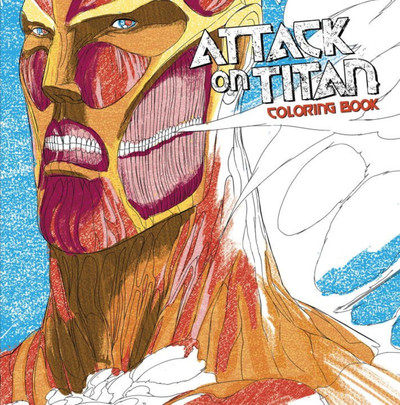
Attack on Titan Adult Coloring Book by Hajime Isayama. Kodansha, $12.99
Rebecca: Of course, if you really want a trip down childhood memory lane, there's always the AoT adult coloring book! It's sixty pages of Hajime Isayama's art for your coloring delectation. Let's just say that you'd better be very good at staying within the lines if you want to produce a pretty picture. Isayama's art is detailed and full of little fiddly bits, so this is an “adult” coloring book both in terms of content and because you need some seriously fine motor skills to color it. It's a mix of splash pages and comic panels, so if you've ever wanted Levi to have orange hair or see a day-glo Titan without ruining your comics, this is your chance.
Is It Worth Coloring? That depends on your coloring skills and how fussy you are about staying inside the lines.
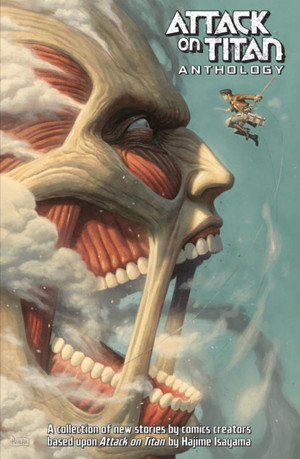
Attack on Titan Anthology, edited by Ben Applegate and Jeanine Shaefer. Kodansha, $29.99
Theron: This hardback volume is a collection of short stories by various American comic artists. It has previously been reviewed in full here, but the short version is that it provides a collection of sometimes-fanciful, sometimes-serious tales set either in the main AoT universe or an alternate interpretation of it. Hardly any of it features core cast members, so this is less a work that expands on the setting and more one that provides different viewpoints on the premise.
Is It Worth Reading? Only if you appreciate alternative artistic interpretations of Attack on Titan's concept.

Attack on Titan: Junior High
Theron: This 12-episode parody series is available from Funimation, both in a Blu-Ray/DVD combo pack and streaming on their website. It has been reviewed in full here (and we also have individual episode reviews), but the short version is that it puts all of the characters into a chibi-fied junior high setting and at least attempts to poke fun at the characters and story. Occasionally, it is actually funny.
Is It Worth Watching? While it does have its moments, it's more miss than hit as a comedy. It definitely should not be watched unless you've seen the entirety of the first season, either way.
What are your favorite spin-offs in the Attack on Titan universe? Share your feedback with us in the forums!
discuss this in the forum (17 posts) |